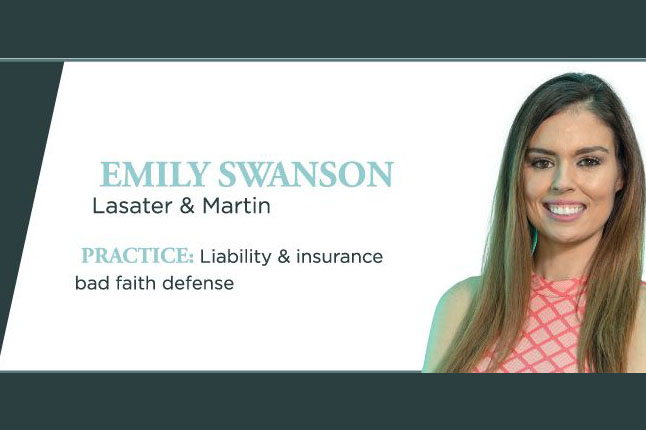
Emily Swanson is no stranger to getting underestimated. Whether she gets mistaken for a legal secretary or runs into assumptions that she practices in a less hard-nosed area of law than litigation, she said the types of sexist treatment she’s faced have certainly been hurtful. But she’s also learned to turn opponents sleeping on her into an advantage. Her opponents shouldn’t then be surprised, she said, when she wallops them in cases.
“Fine, think what you want of me, underestimate me. Do what you want,” Swanson said. “But underestimate me and don’t expect me to come out of nowhere and kick your butt up and down all through court.”
And Swanson, who practices at Lasater & Martin largely in liability and insurance bad faith defense, is making noise with her work. She recently litigated a case involving collateral sources, which in personal injury law prohibits payments from an independent source, such as an insurance company, to an injured person from reducing the amount of damages recoverable by the person from a defendant.
But under state workers’ compensation law, health care providers can’t recover more than what the workers’ compensation fee schedule allows. Swanson explained in her case, she argued the plaintiff couldn’t claim more under the collateral source rules because of the limits of the workers’ compensation fee schedule. As a result, the plaintiff’s claimed damages were reduced by more than $250,000 and the reduction forced a settlement.
But another recent victory happened outside her role as a lawyer, in the court of public opinion. She helped obtain a lifetime ban from USA Volleyball for coach Rick Butler, who has been called the Larry Nassar of the sport. Butler received a lifetime ban from the sport in January following accusations from women who said he sexually abused them when they were players in the 1980s. Since then, he has also received a lifetime ban from the Amateur Athletic Union and Junior Volleyball Association.
Swanson is a coach for USA Volleyball, herself, and she also sits on the organization’s board of directors in the Rocky Mountain Region. Last summer, she posted an article on social media about the restarted effort to get Butler banned, and her post took off because of her large following. One past alleged victim of Butler’s reached out to her and shared letters she received from Butler as a teenager and asked Swanson to post them on social media on her behalf. Swanson also continued posting other documents related to Butler’s conduct, such as a transcript from a 1995 ethics panel hearing that resulted in a lifetime ban from USA Volleyball, only to see him reinstated five years later in an administrative role.
Previous action against Butler has historically been difficult, Swanson said, because his family has taken legal action against those who have come forward. But her legal knowledge coupled with her intimate understanding of the dynamics of USA Volleyball gave her confidence to keep publicizing evidence against Butler because she wasn’t susceptible to the same tactics that had intimidated others, Swanson said.
“Everybody caves because everybody is scared of lawyers. The money, the demand letters, all of that,” she said. “When I started realizing how many people were willing to pay attention to this issue because of what I was doing, I made a choice. … I made a promise to multiple victims that I wouldn’t shut up, no matter how hard they tried. And they tried.” Some tactics used in attempts to intimidate Swanson went as far as emails from Butler’s wife to Lasater & Martin’s partners claiming she was engaging in unauthorized law practice.
Instead of posting all the evidence she had against Butler at one time, Swanson chose to release it in waves. This kept the public engaged in the issue, she said, rather than igniting a bright but fast-burning fire people might quickly lose interest in.
The case made her understand the power wielded by the court of public opinion in a way she hadn’t grasped before, Swanson said. The statute of limitations had passed for criminal charges against Butler, and she said the one thing everyone wanted was a coaching ban for Butler. But the USA Volleyball ban itself has limited usefulness because he could still give private coaching lessons or start his own league.
“It made me realize that law isn’t always the answer, because it can’t do it all,” Swanson said. “And the court of public opinion is incredibly important.”
— Julia Cardi
CORRECTION NOTE: This article was updated March 8, 2023, to clarify the person who contacted Swanson was an alleged victim.

